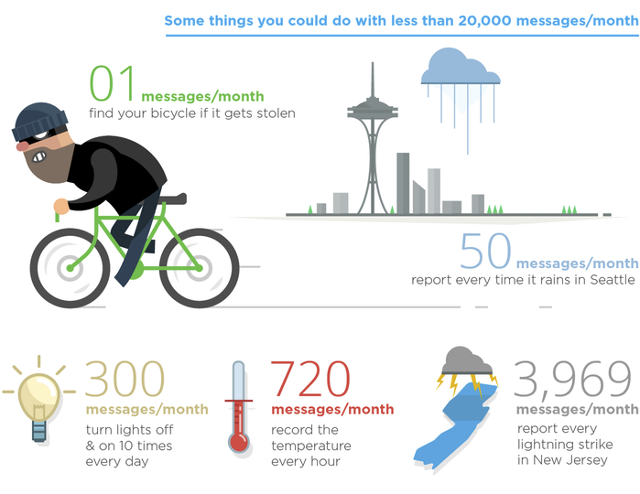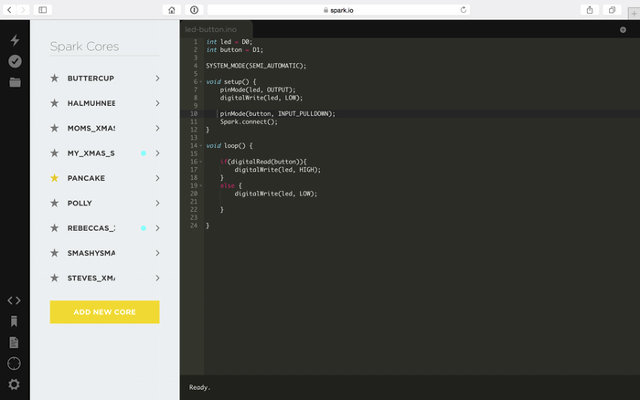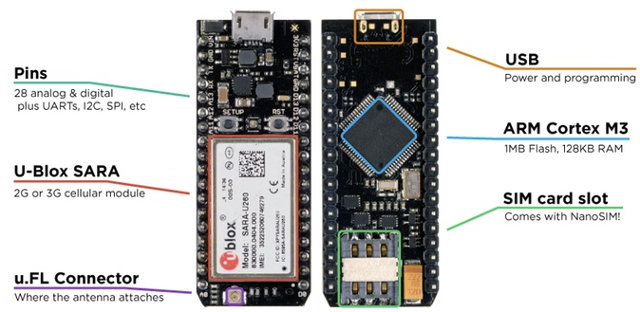Spark IO started with Spark Core, a tiny Wi-Fi module, followed with Spark Photon is a cheaper, faster, and tinier Wi-Fi module, and now the company is launching Spark Electron to bring cellular connectivity to hobbyist projects at an affordable cost and small form factor.
Spark Electron specifications:
- MCU – ST Micro STM32F205 ARM Cortex M3 microcontroller @ 120 MHz with 1MB Flash, 128K RAM
- Cellular Connectivity – U-Blox SARA U-series (3G) or G-series (2G) modem + NanoSIM card slot + u.FL connector for Antenna
- Headers – 36 pins with 28 GPIOs (D0-D13, A0-A13), plus TX/RX, 2 GNDs, VIN, VBAT, WKP, 3V3, RST
- USB – micro USB port for power and programming
- Misc – Setup and reset buttons, LED
- Dimensions – 5.08 cm x 2.03 cm x 0.76 cm (1.27 cm including headers)
The board can be programmed with Wiring (Arduino’s programming language), C/C++, or ARM assembly. It’s longer than Spark Core/Photon, but still compatible with existing shields.
 One problem individuals may have for M2M cellular projects is to find a low SIM card, so the company is also providing a SIM card with a no contract $2.99 monthly plan that currently works in the US, Canada and Europe. The carrier? Themselves, as they have become a Mobile Virtual Network Operator (MVNO) and manage towers and carrier relationship. The plan is good for 1MB data, or about 20,000 SMS with a 50 bytes size, and each additional megabyte cost $0.99.
One problem individuals may have for M2M cellular projects is to find a low SIM card, so the company is also providing a SIM card with a no contract $2.99 monthly plan that currently works in the US, Canada and Europe. The carrier? Themselves, as they have become a Mobile Virtual Network Operator (MVNO) and manage towers and carrier relationship. The plan is good for 1MB data, or about 20,000 SMS with a 50 bytes size, and each additional megabyte cost $0.99.

Development can be done via the company Web IDE running in your browser, or Spark Dev IDE based on Atom project currently available for Windows and Mac, and Linux coming soon. So if you are using Linux, you’ll probably want to go with the Web IDE initially. As previously mentioning, if you’re used to developed on Arduino, Wiring is supported, and development will feel very similar. A REST API is also available, and you can control the module with SparkJS (JavaScript), webhooks, IFTTT, etc.. The core firmware use standards like HTTP, AES, RSA, and CoAP based on open source software.
If you’d like to add cellular connectivity to your objects (maybe your bicycle), but are not into programming, you can use Tinker mobile app for iOS and Android. Spark Electron firmware can be upgraded over the air (FOTA) without any cable.
The project is up on Kickstarter, and has already largely surpassed its $30,000 with $120,000 pledged so far. All early bird reward are gone, but you can still get Spark Electron 2G with a SIM card for $39, and Spark Electron 3G with a SIM card for $59. They also have other kits adding GPS, battery, sensors and various quantities of Electron module. Shipping is free to the US and between $10 to $25 to the countries part of the campaign, and delivery is planned for October 2015. The company notes that 2G networks will be phased out in 2017 in the US, and recommends the 3G module to US residents.

Jean-Luc started CNX Software in 2010 as a part-time endeavor, before quitting his job as a software engineering manager, and starting to write daily news, and reviews full time later in 2011.
Support CNX Software! Donate via cryptocurrencies, become a Patron on Patreon, or purchase goods on Amazon or Aliexpress





